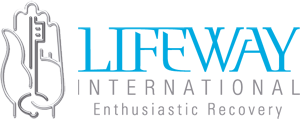
Overview
The unique APG treatment model Lifeway employs integrates important peer connections with sound clinical practice using intervention, support, education, family involvement, social functions, and the feedback from the multiple accountability levels built into its structure. Below is a diagram of Lifeway’s core services:

Culture as Influence
At Lifeway International, we operate from the understanding that substance use disorder (SUD) and the accompanying mental health issues it creates are major concerns to not only the families and individuals who suffer but also to the culture at-large. Therefore to effectively treat SUD, culture needs to be a part of the solution. Peer pressure led them in, so too can peer pressure lead them out. Research, practical, and folk history all support the fact that ‘who we socialize with dramatically influences the directions we grow’. Another way to put it is, “Clean a seed, plant it back in a dirty garden and it bears dirty fruit. In a clean garden, clean fruit. I.e. ‘healthy community, healthy growth.’”
Time Heals But Takes Time
Secondly, research has corroborated and greatly contributed to the creation of an effective treatment program for SUD and the aberrant psychology it creates. A foundational design element of our program is based on how the brain debilitates consistently with the continued use of neurologically damaging substances and how repeated use leads to the rationalization of bad habits until they become second nature for the addict. It’s well known that behavior is one of the hardest things to change.
Stabilization and Long Term Recovery
Research indicates the achievement of stabilization and long term recovery in addition to the significant return of constructive, life affirming good habits takes an average of 18 months to 4 years. The difference depends on when active use started, how often it happened, and the potency of what was used. Prior to the achievement of long term recovery, it is crucial recoverees receive complete care coordination and live within a healthy environment of strong accountability, encouragement, and social fun for a minimum of 18 months – 4 years. This length of time is indicated by research as what is needed for both a recoveree’s brain and behavior to positively and sustainably change for the long term while minimizing their chance of relapse. In short, the longer a recoveree is sober, the higher the likelihood of their continued sobriety.
Lifeway and the APG Model
Given the effects of socialization choices and the time it takes to heal from the aberrant psychology and ingrained bad habits, Lifeway has spent the last 37 years designing and developing solutions for recovery in all age groups. (Today, Lifeway is focused on serving the adult population.)
In 1997, Lifeway coined the term and originated the treatment model of the same name, “Alternative Peer Group (APG) Program” in a paper presented to the national convention of the National Association of Alcoholism and Drug Abuse Counselors (NAADAC). Recent research by Baylor College of Medicine and subsequent studies have upheld success rates of the APG model as being far and above competing approaches.
Criteria for Disease Recovery Simply Put
In addition to being research backed and verified, the strategy and techniques utilized by Lifeway just make sense. If someone with substance use disorder, or any disease for that matter, is attempting to recover, they should: 1) make it difficult to continue behaviors that make them sick e.g. using neurologically damaging substances in the case of SUD, 2) be supported, but not be enabled by significant others in their life, 3) solve psychological, physical, and spiritual issues that contributed to or are the outgrowth of their past behaviors, 4) have safe places in early recovery to work and/or go to school, 5) be led by others who have expertise in achieving long term recovery, 6) have as much fun as possible, and 7) all of the above should be conducted within a structure that offers the best continuity of care and accountability possible.
Interested in learning more about us? Give us a call at (713) 459-9427. We’d love to hear from you.

